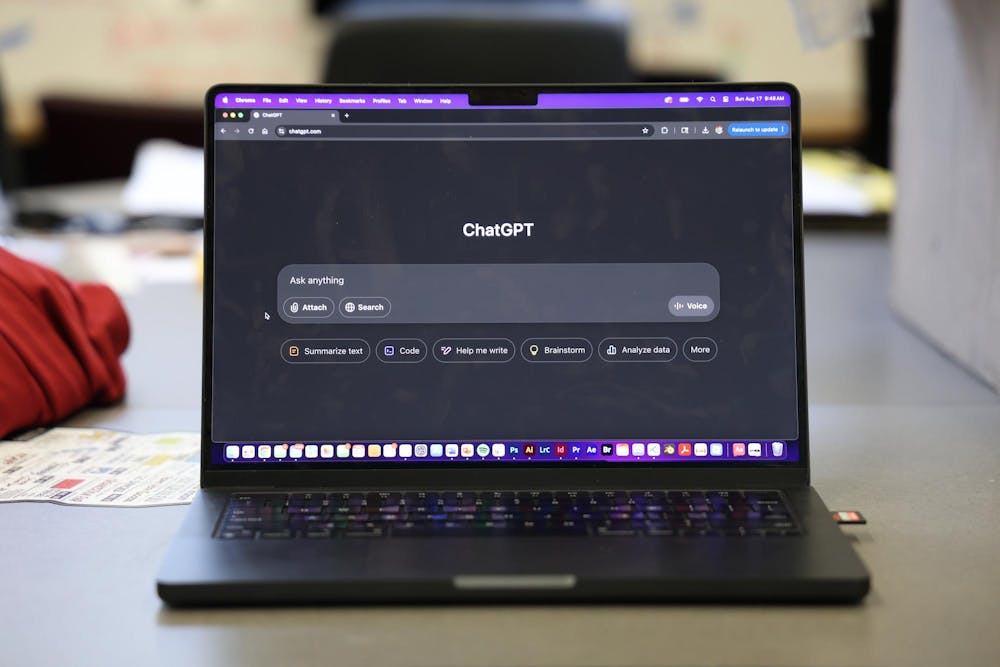On Aug. 15, USC students received a mass email from the Department of IT announcing free ChatGPT access for all students and faculty, part of the university’s contract with artificial intelligence giant OpenAI.
First announced in June 2025, this $1.5 million agreement gives students free access to a USC ChatGPT Edu, a version of the chatbot with tools geared toward universities.
USC’s ChatGPT Edu workspace provides unlimited access to GPT-5, GPT-4, GPT-4o mini and DALL-E image generator. The Division of IT’s email encouraged students to join the workspace and showcased the many ways students could use it, including to edit emails, develop a resume, or help students study and do research.
USC Vice President for Information Technology and CIO Brice Bible also detailed more advanced models that students could access but are not designated as unlimited use. These models would be available by paying with credits the university pre-purchased, Bible said, and could be used for larger and more advanced projects such as data visualization.
Credits would be allocated to students for academic projects on a case-by-case basis, Bible said, and were bought so students and faculty wouldn't have to pay to use more advanced AI tools.

By contracting with OpenAI, USC aims to be at the forefront of higher education institutions adopting AI, Bible said.
“The driver behind this is for the university to not wait at the sideline, but (to) have our faculty and students be part of this fun adventure that's going on with emerging AI, and how AI is going to change the world, and be a part of education and be a part of your future career,” Bible said.
USC chose OpenAI as a partner because its products, such as ChatGPT, were widely used by USC students. Around 15,000-20,000 ChatGPT accounts, both basic and plus, were registered under an sc.edu email address, Bible said.
“(It) seemed to make sense to see how we can make (ChatGPT) more cost-effective, and more secure and more feature rich. In terms of us as a university being able to work together, it seemed like it's the most logical first step for the university to pursue,” Bible said.
USC is one of few universities, and the only one in South Carolina, that provides ChatGPT Edu at the enterprise level, which encompasses the entire university. OpenAI developed the ChatGPT Edu program because they recognized that large research universities would make good partners, Bible said.
OpenAI uses data entered into ChatGPT, such as conversations with the chatbot, to train and improve its AI capabilities, according to its website. However, Bible said the contract with USC stipulates that all data entered into the USC ChatGPT Edu workspace will remain private and not be used to train ChatGPT.
“By contract, they committed to keeping our data private. We can use their models, but … what you've loaded is kept protected and private, so none of that is exposed into their models … and to me, that is a big-time advantage for us to put this contract in place,” Bible said.
Bible said OpenAI committed to data privacy because it can use feedback from student experiences and facilitate AI literacy and expertise among students.
Though USC administrators such Bible emphasized the potential of this contract, some students shared concerns of whether increased access to AI will impact how students learn.
In its email to students, the Division of IT promoted “intentional and responsible,” use of AI, and included a link for students to review the tenets of USC’s policy on AI and academic integrity. Despite this reminder, two students say they believe AI is often used to cheat on coursework.
Second-year public health student Madelyn Havard said that free ChatGPT access could be used to both enhance or replace learning.
“I feel like there's definitely going to be students who want to learn properly and may not use it quite as much or use it in a non-cheating way, but I feel like there are definitely going to be students who utilize it to replace their own work ... I feel like there definitely may be some negative impacts on learning,” Havard said.
Second-year cardiovascular technology student Kylar Klein said she supported the use of AI to help with studying and that it can be a good substitute if other help isn’t available. However, she said she worried that easier access to AI might enable more students to cheat.
“I personally use it from time to time to help me come up with a good study guide … for my exams," Klein said. "But I think that getting a free version of ChatGPT given to us by the school offers a lot of opportunities for people to cheat on papers or lab reports … which I don't think is necessarily (conducive) for good education.”

